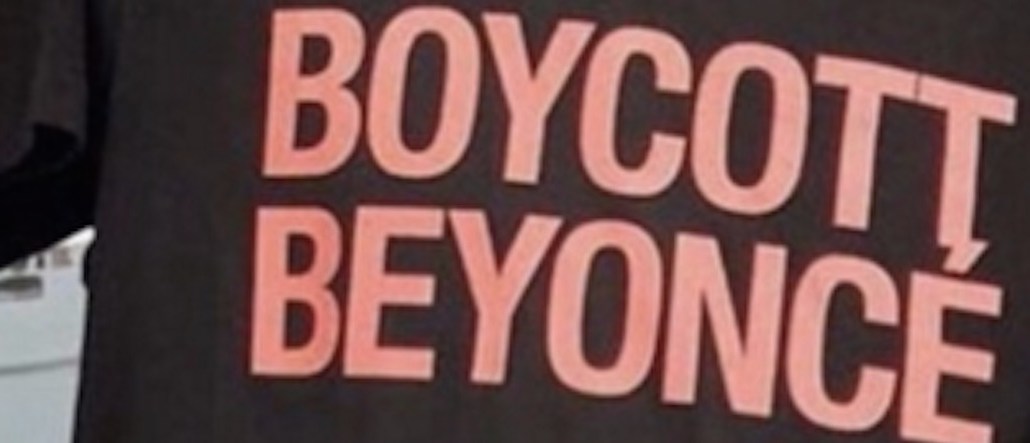Secure your place at the Digiday Publishing Summit in Vail, March 23-25
Beyoncé profits over social media controversy with ‘Boycott Beyoncé’ T-shirt

Taking a cue from her own song “Sorry,” Beyoncé is taking the lyric “middle fingers up” on the road.
She kicked off the Formation World Tour in Miami last night, which expectedly comes with a pricey merchandise table. Placed besides the usual array of keychains, jackets and hats, there’s a T-shirt that’s attracting a lot attention not only for what it says, but for her shrewd business sense.
For $45, the T-shirt reads “Boycott Beyoncé,” a clever nod to a campaign started by the Miami Fraternal Order of Police who took offense to the February release of her “Formation” music video and Super Bowl halftime performance. They complained that the song implied that the police actively promote brutality, and that her backup dancers were wearing Black Panther-like costumes. That sprouted the #BoycottBeyoncé campaign online, mostly stirred from within the conservative press.
She pushed back on the criticism in a recent interview with Elle, saying she has “much admiration and respect for officers and the families of officers who sacrifice themselves to keep us safe.” Beyoncé, however, is not above making a dollar (or, in this case, 45) off the social media controversy with T-shirts and cell phone cases emblazoned with the phrase.
Beyoncé is selling BOYCOTT BEYONCÉ t-shirts as tour merch pic.twitter.com/zjD3HcV7XG
— Beyoncé Australia (@BeyonceAUS) April 27, 2016
Capitalism at its funniest! Beyoncé selling her own Boycott Beyoncé shirts, trolling critics and “protesters” pic.twitter.com/2PaXTRwfYm
— Juliana Jai Bolden (@JulianaJai) April 27, 2016
Beyoncé is selling a boycott beyoncé shirt LMFAOOOO QUEEN BETTER MAKE MONEY OFF THOSE HATERS. WHAT KIND OF SLAY?! pic.twitter.com/NTjQ2l3d8q
— Danny (@dannyyonce) April 27, 2016
Beyoncé has dominated the Internet since last Saturday, when she dropped her album “Lemonade” during an HBO special and sparked more than 4.1 million tweets — and just as many uses of the lemon emoji. Her army of fans, the Beyhive, also stung designer Rachel Roy when the singer implied that she was involved in an extramarital affair with Beyoncé’s husband Jay Z.
More in Marketing

‘The conversation has shifted’: The CFO moved upstream. Now agencies have to as well
One interesting side effect of marketing coming under greater scrutiny in the boardroom: CFOs are working more closely with agencies than ever before.

Why one brand reimbursed $10,000 to customers who paid its ‘Trump Tariff Surcharge’ last year
Sexual wellness company Dame is one of the first brands to proactively return money tied to President Donald Trump’s now-invalidated tariffs.

WTF is Meta’s Manus tool?
Meta added a new agentic AI tool to its Ads Manager in February. Buyers have been cautiously probing its potential use cases.





